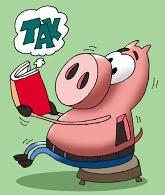 | « Back to article | Print this article |
 Parliamentary Standing Committee on Finance Chairman Yashwant Sinha wants the government to first introduce goods and services tax (GST) at the central level and set example for states to implement the indirect tax reform.
Parliamentary Standing Committee on Finance Chairman Yashwant Sinha wants the government to first introduce goods and services tax (GST) at the central level and set example for states to implement the indirect tax reform.
"I am firmly of the view that the Government of India should introduce GST first at the central level. At the central level you have central excise and you have the service tax. Now, if you first merge the two, you have your own GST.
"Then you present an example to the states that this is how we do GST and the states might follow," Sinha told PTI in an interview. The senior BJP leader also slammed the UPA Government for its plan to introduce GST Constitutional Amendment bill in in the current budget session of Parliament, without taking states on board. "They are doing a wrong thing," the former finance minister said.
The proposed GST has been hanging fire, with all the three drafts of GST constitutional amendment bill proposed by the Centre, being opposed mainly by the BJP-ruled states. The government has listed GST Constitution Amendment Bill to be introduced in the forthcoming Budget session.
After that it would be referred to the Standing Committee on Finance. The passage of the Bill would require two-third majority in both the houses of Parliament and two-third majority in states assemblies. He also attacked Prime Minister Manmohan Singh for his remarks that the BJP was opposing the government's reforms agenda because it wanted some decision against a minister in Gujarat to be reversed.
"The reasons that have been given, frankly, I cannot mention it in public... They (BJP) say because you have taken some decision against a particular person, who was a minister in Gujarat, we must reverse it," Singh had said recently.
Sinha said several states, including those ruled by the BJP, were opposed to introduction of the GST because of their own interests and not due to any partisan issue.
He said it was unexpected and "unbecoming" of the Prime Minister to have made an "unparliamentary" remark about the BJP stalling the tax and other economic reforms. He said there were differences of opinion even among the BJP-ruled states on GST.
"It is not Gujarat, it is Madhya Pradesh, which has been strongly opposing GST from day one. It happened years before Amit Shah (former Gujarat Home Minister who was arrested in Sohrabuddin Sheikh alleged fake encounter case)... so why Madhya Pradesh is opposing it?"
States like MP are opposing the GST because it has genuine concerns, Sinha said, adding that even the non-BJP states were also opposing it. "UP is not a BJP-ruled state..it is opposing," Sinha said.
After missing the original April 2010 deadline for GST rollout, the government proposed to introduce it in April 2011. But it is all set to miss this deadline too. The GST will subsume indirect taxes such as excise duty and service tax at the central level and VAT on the states front, besides local levies.